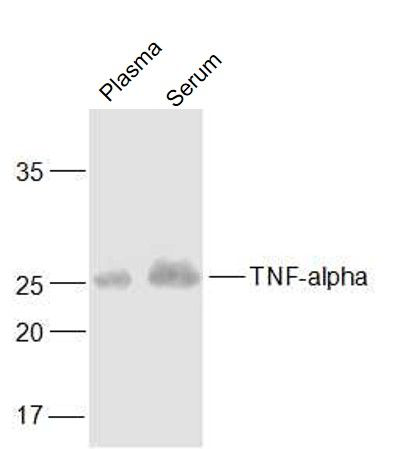产品货号 : mlR33207
英文名称 : TNF-alpha
中文名称 : 肿瘤坏死因子-α单克隆抗体
别 名 : tumor necrosis factor-α; APC1; Cachectin; DIF; Differentiation inducing factor; Macrophage cytotoxic factor; MCF; Necrosin; TNF a ; TNF alpha; TNF; TNF Macrophage Derived; TNF Monocyte Derived; TNF Superfamily Member 2; TNFA; TNFSF2; Tumor necrosis factor ligand superfamily member 2; Tumor Necrosis
Factor Precurso; Tumour Necrosis Factor Alpha.
研究领域 : 细胞骨架 细胞外基质
抗体来源 : Mouse
克隆类型 : Monoclonal
克 隆 号 : 3A4
交叉反应 : Human, Mouse, Rat, Chicken, Dog, Pig, Cow, Rabbit, Sheep, Guinea Pig, Monkey, Insect, Yeast
产品应用 : WB=1:1000-2000 ELISA=1:5000-10000 IHC-P=1:200-500 IHC-F=1:200-500 ICC=1:100-500 IF=1:200-500 (石蜡切片需做抗原修复)
not yet tested in other applications.
optimal dilutions/concentrations should be determined by the end user.
分 子 量 : 17/26kDa
细胞定位 : 细胞膜 分泌型蛋白
性 状 : Lyophilized or Liquid
浓 度 : 1mg/ml
免 疫 原 : Recombinant human TNF alpha 77-233aa :
亚 型 : IgG1
纯化方法 : affinity purified by Protein G
储 存 液 : 0.01M TBS(pH7.4) with 1% BSA, 0.03% Proclin300 and 50% Glycerol.
保存条件 : Store at -20 °C for one year. Avoid repeated freeze/thaw cycles. The lyophilized antibody is stable at room temperature for at least one month and for greater than a year when kept at -20°C. When reconstituted in sterile pH 7.4 0.01M PBS or diluent of antibody the antibody is stable for at least two weeks at 2-4 °C.
PubMed : PubMed
产品介绍 : Tumor Necrosis Factor Alpha (TNF alpha) is a protein secreted by lipopolysaccharide stimulated macrophages, and causes tumor necrosis when injected into tumour bearing mice. TNF alpha is believed to mediate pathogenic shock and tissue injury associated with endotoxemia. TNF alpha exists as a multimer of two, three, or five noncovalently linked units, but shows a single 17 kDa band following SDS PAGE under non reducing conditions. TNF alpha is closely related to the 25 kDa protein Tumour Necrosis Factor beta (lymphotoxin), sharing the same receptors and cellular actions. TNF alpha causes cytolysis or cytostasis of certain transformed cells, being synergistic with interferon gamma in its cytotoxicity. Although it has little effect on many cultured normal human cells, TNF alpha appears to be directly toxic to vascular endothelial cells. Other actions of TNF alpha include stimulating growth of human fibroblasts and other cell lines, activating polymorphonuclear neutrophils and osteoclasts, and induction of interleukin 1, prostaglandin E2 and collagenase production. TNF alpha is currently being evaluated in treatment of certain cancers and AIDS Related Complex.
Function:
Cytokine that binds to TNFRSF1A/TNFR1 and TNFRSF1B/TNFBR. It is mainly secreted by macrophages and can induce cell death of certain tumor cell lines. It is potent pyrogen causing fever by direct action or by stimulation of interleukin-1 secretion and is implicated in the induction of cachexia, Under certain conditions it can stimulate cell proliferation and induce cell differentiation.
The TNF intracellular domain (ICD) form induces IL12 production in dendritic cells.
Subunit:
Homotrimer. Interacts with SPPL2B..
Subcellular Location:
Cell membrane; Single-pass type II membrane protein.
Tumor necrosis factor, membrane form: Membrane; Single-pass type II membrane protein.
Tumor necrosis factor, soluble form: Secreted.
C-domain 1: Secreted.
C-domain 2: Secreted.
Post-translational modifications:
The soluble form derives from the membrane form by proteolytic processing. The membrane-bound form is further proteolytically processed by SPPL2A or SPPL2B through regulated intramembrane proteolysis producing TNF intracellular domains (ICD1 and ICD2) released in the cytosol and TNF C-domain 1 and C-domain 2 secreted into the extracellular space.
The membrane form, but not the soluble form, is phosphorylated on serine residues. Dephosphorylation of the membrane form occurs by binding to soluble TNFRSF1A/TNFR1.
O-glycosylated; glycans contain galactose, N-acetylgalactosamine and N-acetylneuraminic acid.
DISEASE:
Genetic variations in TNF are a cause of susceptibility psoriatic arthritis (PSORAS) [MIM:607507]. PSORAS is an inflammatory, seronegative arthritis associated with psoriasis. It is a heterogeneous disorder ranging from a mild, non-destructive disease to a severe, progressive, erosive arthropathy. Five types of psoriatic arthritis have been defined: asymmetrical oligoarthritis characterized by primary involvement of the small joints of the fingers or toes; asymmetrical arthritis which involves the joints of the extremities; symmetrical polyarthritis characterized by a rheumatoidlike pattern that can involve hands, wrists, ankles, and feet; arthritis mutilans, which is a rare but deforming and destructive condition; arthritis of the sacroiliac joints and spine (psoriatic spondylitis).
Similarity:
Belongs to the tumor necrosis factor family.
SWISS:
P01375
Gene ID:
7124
Important Note:
This product as supplied is intended for research use only, not for use in human, therapeutic or diagnostic applications.
产品图片












